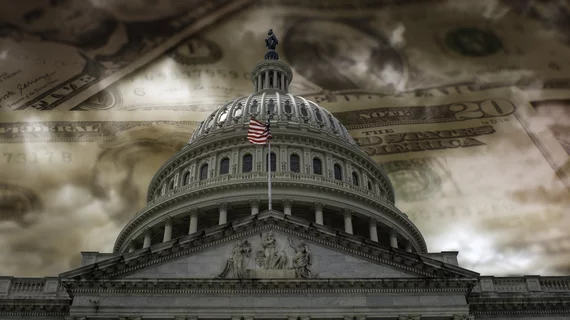Physician Medicare pay fix in jeopardy following criticism from Donald Trump, Elon Musk
UPDATE on Dec. 21: Congress on Friday, Dec. 20, passed a slimmed down version of the original continuing resolution with no physician Medicare pay fix.
A continuing resolution to partially reduce the looming physician Medicare pay cut is now in jeopardy amid congressional infighting.
Lawmakers had reached a bipartisan deal Tuesday to avert a government shutdown and give docs a 2.5% temporary payment increase, offsetting a 2.8% cut to the conversion factor. However, before the proposal could pass, congressional leaders yanked it at the urging of president-elect Donald Trump and tech billionaire Elon Musk.
The two had criticized policy add-ons in the original 1,500-page bill, including several healthcare provisions, The Hill reported. House Speaker Mike Johnson, R-La., attempted to pass a slimmed down version Thursday but it failed, leaving uncertainty around next steps.
Rep. Greg Murphy, MD, R-N.C.—a physician who has championed solutions to the Medicare pay problem—slammed the situation Thursday.
“As a matter of principle, I generally do not support continuing resolutions to keep our country running. Unfortunately, despite great efforts to fund the federal government through regular order in a narrowly divided Congress, we cannot do so,” Murphy said in a statement shared Dec. 19. “I am terribly disappointed physicians who see Medicare patients will receive yet another ridiculous pay cut, jeopardizing access to high-quality, affordable care for millions, especially those in rural areas. However, I have been assured that the incoming Trump administration will address this issue in March as well as retroactively rectify it.”
Physician advocacy groups such as the Medical Group Management Association had labeled the original resolution as a “mixed bag.” Along with the partial pay fix, it also extended telehealth flexibilities through 2026 and increased alternative payment model incentives. However, it did not include radiologist-supported provisions to reform prior authorization in Medicare Advantage, as some had hoped.
Healthcare policy expert Ed Gaines noted Thursday that physicians may face a “worst case scenario” on Jan. 1 with the continuing resolution in jeopardy. The original CR also had addressed a -4% PAYGO cut on top of the -2.83% conversion factor reduction. This would amount to a -6.83% cut with no standalone “doc fix” by mid-January. Medicare Administrative Contractors generally pay claims on a 14-day basis, with the first adjudication occurring around Jan. 15. The new Congress is slated to be sworn in Jan. 3 and the new president Jan. 20.
“The window for a standalone bill is very narrow,” Gaines, who is VP of regulatory affairs and industry liaison with Zotec Partners, wrote Dec. 19 on X.com.
The Medical Society of the State of New York also slammed the situation in a statement one representative shared on social media in response to Gaines’ post.
“It was bad enough that the original end of the year Congressional package didn’t fully stop the steep Medicare cuts that our nation’s dedicated physicians will face in 2025. Now, due to political shenanigans and political pandering over the last 24 hours, our seniors may face even worse patient access to care issues in 2025 if Congress were to pass the latest continuing resolution announced this afternoon that fails to stop ANY part of this stunningly unfair cut,” gastroenterologist and MSSNY President Jerome Cohen, MD, said Thursday. “Clearly, the needs of our patients and our healthcare system are irrelevant compared to scoring political points. Congress needs to again go back to the drawing board and make sure that they FULLY stop the Medicare physician pay cut before the end of the year. Our patients are depending upon it.”
Lawmakers now face a midnight deadline Friday to reach a deal and avert a government shutdown.
This is a developing story. Radiology Business will have more.

